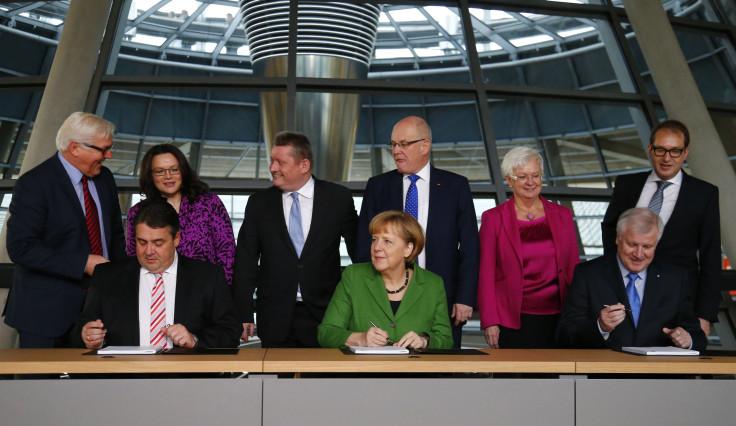Angela Merkel’s Conservatives Strike Coalition Deal With Center-Left Social Democrats

German Chancellor Angela Merkel’s conservatives and the country’s main center-left party struck a deal on Tuesday night to form a grand coalition government, following negotiations that lasted more than two months since general elections were held in the country.
Merkel’s Christian Democratic Union, or CDU, and its ally, Christian Social Union, or CSU, held talks with the Social Democratic Party, or SPD, to reach an agreement that came after 17 hours of tense negotiations. The CDU/CSU alliance’s usual coalition partner, the Free Democratic Party, had failed to win any seats in the polls held in September, leading Merkel’s alliance to fall short of a majority.
“The work is done. It has been very intense and sometimes very hard work today but I think we have a result that is good for our country which is the main measure, but we can also say the result has a strong Conservative imprint,” CDU secretary general Hermann Groehe said, BBC reported. “No new taxes and no new debts.”
The SPD’s main demand for a nationwide minimum wage was accepted by leaders of the CDU/CSU, and as a result, an hourly minimum pay of 8.50 euros ($11.55) will be effective from 2015, BBC reported. The conservatives received an assurance that taxes will not be raised, although the SPD had advocated a tax hike during the election campaign.
Senior SPD lawmaker Karl Lauterbach said, “the Social Democratic signature on this coalition agreement is everywhere,” Associated Press reported.
Merkel is expected to be sworn in for a third term in December, after SPD members approve the deal. The SPD was part of a grand coalition with the CDU/CSU alliance between 2005 and 2009.
All parties agreed to settle issues including a lower retirement age and modifications to rules regarding dual citizenship, BBC reported.
The German Ministry of Finance estimates a total of about 50 billion euros ($68.7 billion) in additional expenses to implement plans proposed by the coalition partners. However, until 2017, the country's budget surpluses would only allow for an additional 15 billion euros in spending, according to a report by Germany’s Der Spiegel. Any expenses exceeding that amount need to come from taxes, but under the current agreement neither taxes nor debt can be increased.
Details about sharing cabinet posts among the coalition partners are not likely to be announced until after SPD members approve the agreement.
Lauterbach said the SPD “succeeded on the most important points” but many members continue to have “reservations” about joining the coalition.
The CDU won about 41.5 percent of the vote, while the SPD received 26 percent, according to news reports.
© Copyright IBTimes 2024. All rights reserved.






















